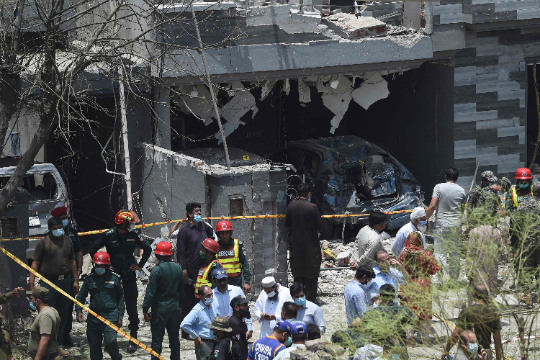Erroneous allegation
Rather than making baseless comments against India around Johar Town blast, Pakistan needs to fix its exposed faulty intelligence system

Almost along the expected lines, the Pakistani establishment — led by Prime Minister Imran Khan — has embarked upon a virulent campaign against India, blaming it for allegedly carrying out a blast near the residence of Jamaat-ud-Dawa (Lashkar-e-Taiba) chief Hafiz Saeed in Lahore's Johar Town neighbourhood. It is noteworthy here that the experts cannot afford to ignore carefully choosing to express Jamaat-ud-Dawa instead of the LeT. It is very much in the public domain that the LeT mastermind Hafiz Saeed had planned and executed the dastardly terror attack on the Indian Parliament in December 2001. Although, the Pakistani sponsors of such terror assaults tend to delink LeT or Hafiz Saeed's role in the two-decades-old terror misadventure targeting other Indian spots as well. Counter-terror experts across the world have been articulating that Hafiz Saeed enjoyed the blessings of the State and was thoroughly trained in executing deadly terror attacks on Indian targets.
The recent Johar Town attack near Hafiz Saeed's location is being conveniently blamed upon Indian intelligence agencies, as was evident in a press conference on July 5, addressed by the Information Minister Fawad Chaudhry, National Security Advisor Moeed Yusuf, and the Punjab Police Chief Imam Ghani. Addressing the media, the top functionaries of the Pak government insinuated a high level of sophistication in the Middle East using Pakistani frontmen, making it difficult to establish a direct connection to Indian agencies. Rattled by the detonation caused in the vicinity of Hafiz Saeed's residence, the key men of the Pakistani dispensation alleged that the attack coincided with thousands of coordinated cyberattacks on the country's information infrastructure.
Meanwhile, the Foreign Minister of Pakistan, Shah Mahmood Qureshi exceeded his diplomatic niceties, as he has done in the past on numerous occasions, and called upon the Financial Action Task Force (FATF) to initiate an action against India for mounting a terror attack on the Pakistani soil. Qureshi is conveniently forgetting, with selective amnesia, that this important Paris-based watchdog has not taken Pakistan off the list of countries still afflicted with terror and, as a result, Pakistan continues to be on the grey list imposed by the independent agency FATF.
Indulging in such an unfortunate blame game, Pakistan is losing focus on its own backyard where the home-grown terrorists flourish under the State's patronage. They have now spun out of control and are often noticed targeting various infrastructures within Pakistan. In the light of this, it would perhaps be imperative that the Pakistan authorities, especially the all-powerful military and the ISI, take a close look at the growing discontent among the dissenters in Balochistan, Sindh and even in PoK to know the ground reality instead of faulting India for the terror attack.
There are innumerable cases that can easily be illustrated to point out the series of terror attacks carried out in various locations in Pakistan by the local armed cadres who are fighting for autonomy, more freedom of expression and better human rights treatment from the Federal government. The Johar Town terror attack which has jolted Hafiz Saeed and his mentors has also exposed the incompetence and incapabilities of the Pakistani intelligence and security agencies. With so much of military intelligence footprints intruding into the civilian domains of intelligence agencies, such high-profile terror happenings confirm that the Pak intelligence machinery is in tatters. It is, therefore, not difficult to estimate that an abject intelligence failure is causing such a spate of terror attacks and the Pakistani agencies have little or no whiff of such an incident of massive repercussion coming.
Sources in Pakistan, in the meantime, who are familiar with terror-linked developments, disclosed in anonymity that the Pakistani intelligence and security leadership seems rudderless by the slew of terror incidents, and they now need to revamp their intelligence infrastructure, perhaps bereft of further Khaki interference. However, this prescription looks improbable due to multiple agencies interfering with each other in the absence of clear coordination. If this grey area is not addressed, glaring failure in gathering human or technical intelligence to prevent terror-related recurrences will continue to rock Pakistan, making it more hapless and frustrated.
The writer is a retired IPS officer, a security analyst and a former National Security Advisor to the PM of Mauritius. Views expressed are personal



